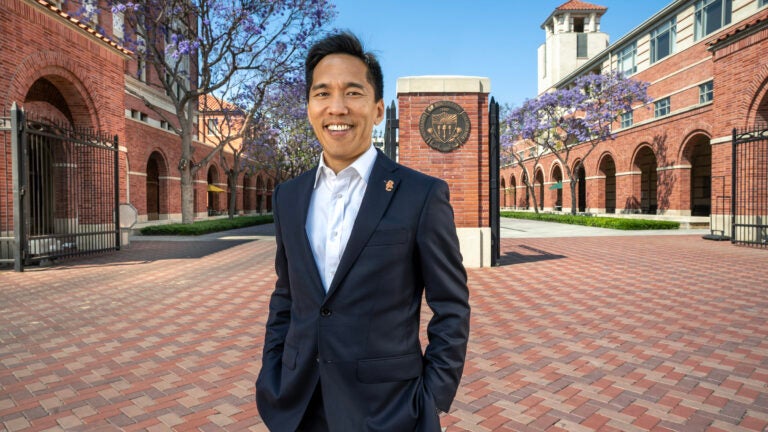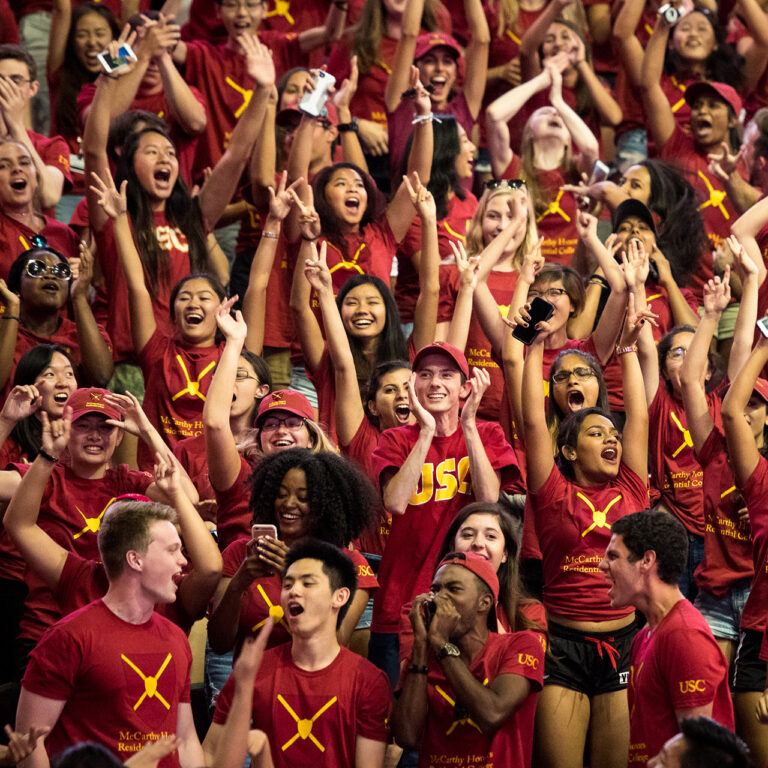Beong-Soo Kim is serving as USC’s interim president starting July 1. (USC Photo/Gus Ruelas)
University
Meet Beong-Soo Kim, USC’s new interim president
Kim, who has served as USC senior vice president and general counsel for five years, talks about the challenges and opportunities ahead, his plans as interim president — and what practicing law and playing the cello have taught him about leadership.
In February, the USC Board of Trustees appointed Beong-Soo Kim as interim president effective July 1. The son of Korean immigrants who both attended graduate school at USC, he is the first Asian American to lead the university. Before joining USC as senior vice president and general counsel in 2020, Kim served as an executive at Kaiser Permanente and as a senior federal prosecutor. He will serve in the interim position until a new president takes office.
“Beong has demonstrated dedication to the university’s academic, research and health care missions and commitment to excellence. His thoughtful and balanced leadership, his compassion for everyone in the Trojan Family and his integrity make him the right person to lead USC at this time,” USC Board of Trustees Chair Suzanne Nora Johnson said. “Beong’s exemplary abilities to listen deeply, communicate openly and collaborate in decision-making have garnered respect across the university. His extensive knowledge and experience make him uniquely suited to guiding the university through the opportunities and challenges facing higher education at this critically important moment of transition.”
Kim recently spoke with USC News about his vision for USC.
What are your thoughts about how best to move the university forward?
Beong-Soo Kim: This is an incredibly tumultuous time for higher education. The challenges include cuts in federal research funding, threats to international student enrollment and more. Even though the next several months are going to be very challenging, I think there are ways that we can turn these challenges into opportunities. The pressure that comes from situations like the one we’re in can help clarify where our strengths lie and where we can improve. The key to all of this work is to reground ourselves in the university’s core mission of academic excellence.
What opportunities do you see in how we approach research?
Kim: There are opportunities to combine resources across USC’s schools and do things more efficiently. That’s going to add more value to taxpayers and society.
We also have an important opportunity for communication — really engaging people so they understand what, why and how USC research provides as much value as it does. Our researchers are on the cusp of preventing Alzheimer’s, curing blindness and making breakthroughs in AI.
There’s so much important work being done at USC that is critical not just to health, but also to national security, to student success, to our communities and to our nation. We have to make sure that this message is conveyed.
What additional priorities do you have for the coming year?
Kim: Focusing on academic excellence. That’s why we are here. That’s the most important thing, full stop. I’m talking about teaching. I’m talking about research. I’m talking about all the things that our faculty, students and staff do to support our academic mission.
I also want to spend more time supporting our amazing health system, where Senior Vice President for Health Affairs Steven Shapiro and CEO of Keck Medicine of USC Rodney Hanners provide terrific leadership. The cutting-edge health care offered by USC faculty and providers is so important to achieving our ambitions as a major research university.
With 23 schools, along with our health system, we have these amazing opportunities at USC to combine disciplines in a way that’s unparalleled: AI and medicine, dance and computation. My job is to catalyze and facilitate the amazing things that can happen when USC’s different disciplines collide and create new sparks of discovery and insight.
What changes do you see coming to higher education as AI advances?
Kim: AI is absolutely going to transform the workforce, the nature of work and, in turn, how we think about universities. We’re probably already at a point where these large language models [such as ChatGPT] know — just in terms of data — much more than all our faculty combined.
At the same time, I am incredibly optimistic about the future of universities like USC, where people can come together in their dorm rooms, classrooms and at the Coliseum to form lifelong bonds. At USC, we’re already leveraging these new technologies to expand the possibilities of individual expression. But we’ve got to get serious about how we’re going to need to change when, five or ten years from now, there’s an upstart AI university with avatar faculty.
We need to lean into that future and see these threats as opportunities for USC to lead. Our history is one of innovation. We are uniquely well-positioned to get ahead of these trends and figure out how to bring AI into the classroom while also preserving what is so special about the university experience that we provide.
How will you lead USC at a time when universities are being criticized for failing to promote a wide range of viewpoints?
Kim: I want to focus on creating an academic environment where a variety of viewpoints is not only tolerated but welcomed as opportunities to debate, discuss, learn, advocate and advance the pursuit of truth. John Stuart Mill and Oliver Wendell Holmes Jr. developed this idea of a “marketplace of ideas.” The core concept is that, in a democracy and at any great university, we need to have a clash of different ideas to advance academic excellence and truth.
Tell us about your own academic experiences, starting with undergraduate studies at Harvard University and then graduate school at the London School of Economics and Harvard Law School.
Kim: I pursued interdisciplinary work in social and political theory at Harvard, and it was an exhilarating time for me intellectually. I then went to the London School of Economics, where I studied philosophy and ethics. I was interested in going into academia, but then I spent another year working in New York City government and thought, “Maybe I should consider law school, where I can explore these political and moral questions but also get a degree where I can get involved in court cases and have an impact.” I was thinking I would become a law professor.
After law school at Harvard, clerking for a judge and a bit of teaching, I started down the path of legal practice and almost gave up on my dream of working at a university — until in this very serendipitous way, I landed back at USC. While I haven’t been able to teach as much as I would have liked over my career, I feel extremely fortunate to be in a position where I can serve as a champion of our faculty and an enabler of academic excellence, freedom and inquiry. It’s a tremendous privilege.
You say, “landed back at USC.” What were your prior USC experiences?
Kim: Both of my parents are from Korea. After getting married and moving to Los Angeles, they came to USC. My mother received her master’s degree in education from USC in 1970. My father did PhD coursework here in economics. When I was a child growing up in Woodland Hills, my dad watched USC football games on television.
My other early touchpoint with USC was through music. I started playing the cello at age 5. I was so fortunate to be a student of the late, legendary cellist Eleonore Schoenfeld, who was a professor at the USC Thornton School of Music, when I was in high school. Her sister, the late Alice Schoenfeld, a violinist and USC Thornton professor, coached my chamber music groups. I would come to the USC University Park Campus to perform or to hear concerts.
I always understood the importance of USC in the fabric of Los Angeles — culturally, academically and athletically. In 2007, I was excited to return to USC as an adjunct professor at the USC Gould School of Law.
How has your legal career helped prepare you to lead the university?
Kim: Every lawyer has a fiduciary duty to fight for their client’s interests. Since I came to USC as general counsel, my duty has been not to any individual but to the institution and the mission of the institution. Being part of a mission that really matters to our society has always been really important to me, and I think that’s what attracted me to USC.
The law is also useful because, as Alexis de Tocqueville observed, so many of our society’s moral, political and social issues get reflected, and often resolved, through our legal system. Higher education is a microcosm of the debates, divisions and concerns that we are experiencing in the rest of society. The law has given me a very useful framework for understanding and articulating these issues that are so important in higher education and our society.
What are your thoughts on the milestone USC recently reached of having 500,000 alumni in the Trojan Family?
Kim: Passing the 500,000 alumni mark is an incredible reminder of how important USC is, not just to our community, but to the nation and the world. The Trojan Family is such a powerful force. It’s such a differentiator. It’s what makes USC so special. It’s what makes our alums so proud to be graduates of USC, to be supporters of USC — and it shows up in so many ways.
During the interim period, I want to do everything I can to reach out to both alumni who have been actively involved with the university since they graduated and those who may not have been as active or aware of what’s happening on campus. I want to make every single alum of USC feel as proud as they’ve ever been in this institution and what it does for our community, for our students, for our country and for the world.
How do athletics figure into what makes USC and the Trojan Family so special?
Kim: Athletics really brings the Trojan Family together. We just achieved our highest-ever position — No. 2 in the country — in the Learfield Director’s Cup standings. Our student-athletes are excelling across so many different sports. They’re also excelling in the classroom. We recently announced our best student-athlete graduation and academic GPA rates ever. We have, I think, the best athletic director in the country in Jen Cohen. And I feel very good about our football program this year.
Jen often says something which I believe in and think a lot about, not just in athletics, but as a leadership lesson for myself: “winning from the inside out.” What that means is that you don’t win through luck. You don’t win by cutting corners. The goal isn’t to win just one game or just one season or in just one sport. Winning from the inside out means creating a culture where everyone is committed to putting in the hard work required to achieve lasting success. I want to create that same kind of winning culture for the entire university.
You’ve played the cello since age 5 and even gave classical porch concerts at your home during the COVID-19 pandemic. How have your musical experiences shaped you?
Kim: What I love about music is the opportunity it creates to connect with other people. I won’t go so far as to say I’ve learned to be a leader from playing chamber music, but there are so many parallels. When you’re playing chamber music, you have to listen to other people, but you also have to show up when your solo line comes along. You’re creating something that’s really beautiful and doing it with other people who have a shared vision.
That’s what we’re trying to do at USC: We’re trying to create some incredible music together. As interim president, I’m just the conductor.

